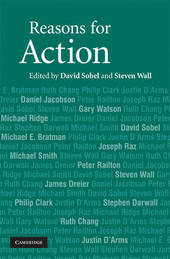
|
Reasons for Action
Hardback
Main Details
| Title |
Reasons for Action
|
| Authors and Contributors |
Edited by David Sobel
|
|
Edited by Steven Wall
|
| Physical Properties |
| Format:Hardback | | Pages:298 | | Dimensions(mm): Height 235,Width 158 |
|
| Category/Genre | Philosophy
Ethics and moral philosophy |
|---|
| ISBN/Barcode |
9780521877466
|
| Classifications | Dewey:170.42 |
|---|
| Audience | | Tertiary Education (US: College) | |
|---|
|
Publishing Details |
| Publisher |
Cambridge University Press
|
| Imprint |
Cambridge University Press
|
| Publication Date |
27 April 2009 |
| Publication Country |
United Kingdom
|
Description
What are our reasons for acting? Morality purports to give us these reasons, and so do norms of prudence and the laws of society. The theory of practical reason assesses the authority of these potentially competing claims, and for this reason philosophers with a wide range of interests have converged on the topic of reasons for action. This volume contains eleven essays on practical reason by leading and emerging philosophers. Topics include the differences between practical and theoretical rationality, practical conditionals and the wide-scope ought, the explanation of action, the sources of reasons, and the relationship between morality and reasons for action. The volume will be essential reading for all philosophers interested in ethics and practical reason.
Author Biography
David Sobel is Robert R. Chambers Distinguished Professor of Philosophy and the Moral Sciences at the University of Nebraska. Steven Wall is Associate Professor in the Department of Philosophy, University of Connecticut.
ReviewsReview of the hardback: 'Sobel and Wall's collection Reasons for Action brings together twelve important essays about reasons for action, practical reasoning, and rational choice, by some of the leading philosophers in the field today (as well as a useful introduction by the editors themselves). The essays approach these issues from several different points of view, but every one of these essays is an illuminating contribution to the contemporary debates. Everyone who is seriously interested in these questions will find their understanding enriched by a careful study of these essays.' Ralph Wedgwood, University of Oxford
|